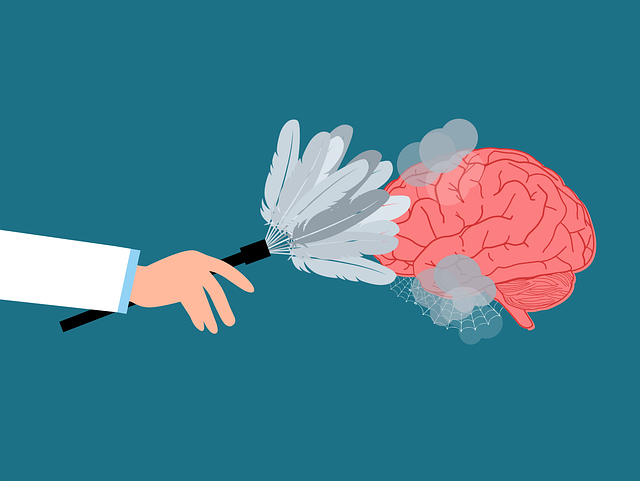Arvada Learning Disability Therapy focuses on emotional intelligence (EI) as a cornerstone of their approach, using self-awareness exercises to help individuals manage and utilize their emotions effectively. By addressing common emotional challenges like frustration, low self-esteem, and anxiety stemming from learning differences, they build resilience and coping mechanisms for improved mental health. Through journaling, mindfulness, trauma support, and empathy development, Arvada empowers clients to navigate social interactions with confidence and sensitivity, fostering inclusive environments that enhance overall well-being.
Emotional intelligence (EI) is a powerful tool that can transform daily interactions and personal growth, especially for individuals navigating learning disabilities. In this article, we explore the concept of EI and its profound impact on various aspects of life. We delve into strategies tailored to Arvada Learning Disability Therapy, focusing on self-awareness and empathy. By understanding and managing emotions, one can overcome challenges associated with learning disabilities, fostering stronger relationships and enhanced overall well-being.
- Understanding Emotional Intelligence and Its Impact on Daily Life
- Identifying and Overcoming Learning Disability-Related Emotional Challenges
- Strategies for Enhancing Self-Awareness in Arvada Learning Disability Therapy
- Practicing Empathy: Building Stronger Relationships Through Emotional Intelligence
Understanding Emotional Intelligence and Its Impact on Daily Life

Emotional intelligence (EI) is a powerful tool that enables individuals to navigate their daily lives with greater ease and understanding. It involves recognizing, managing, and effectively utilizing one’s own emotions, as well as comprehending and empathizing with the feelings of others. This ability to connect emotionally fosters deeper relationships, improves communication, and enhances overall mental health.
At Arvada Learning Disability Therapy, we emphasize the importance of EI in promoting Mental Health Awareness and preventing issues like Depression. By incorporating Self-Awareness Exercises into therapy sessions, our experts guide clients towards a profound understanding of their emotions. This process helps individuals build resilience, make informed decisions, and improve their overall quality of life, ensuring they can confidently face the challenges that arise in their personal and professional lives.
Identifying and Overcoming Learning Disability-Related Emotional Challenges

Many individuals with learning disabilities face unique emotional challenges that can impact their overall well-being. Identifying and addressing these issues is a crucial step in Arvada Learning Disability Therapy. Therapists play a vital role in helping clients navigate and overcome feelings of frustration, low self-esteem, and anxiety often associated with learning differences. Through tailored strategies, individuals can develop emotional resilience and learn coping mechanisms to manage their mental health effectively.
Community outreach programs and advocacy initiatives, like those focused on Mental Health Policy Analysis and Advocacy, can further support these efforts. By raising awareness and promoting understanding of learning disabilities, these programs foster inclusive environments that enhance Emotional Well-being Promotion Techniques. This collective approach ensures individuals with learning disabilities receive the necessary support to thrive, fostering a sense of belonging and empowerment within their communities.
Strategies for Enhancing Self-Awareness in Arvada Learning Disability Therapy
Building self-awareness is a cornerstone of Arvada Learning Disability Therapy, empowering individuals to navigate life’s challenges with resilience. Therapists encourage clients to explore their emotions, thoughts, and behaviors, fostering a deeper understanding of themselves. This process involves reflective practices like journaling, where individuals can meticulously document their experiences, patterns, and triggers. Such introspection allows for the recognition of emotional cues and thought processes, enabling better management of reactive responses.
Additionally, engaging in mindfulness exercises, such as meditation or deep breathing, helps clients cultivate present-moment awareness, making it easier to identify and address immediate emotional needs. Incorporating these strategies into daily routines encourages consistent self-reflection and promotes healthy coping mechanisms. For those with learning disabilities or related challenges, Arvada Learning Disability Therapy offers tailored trauma support services, healthcare provider cultural competency training, and self-care routine development for better mental health, ensuring a holistic approach to enhancing self-awareness.
Practicing Empathy: Building Stronger Relationships Through Emotional Intelligence

Practicing empathy is a cornerstone of emotional intelligence that can significantly strengthen relationships. By putting ourselves in another person’s shoes and understanding their feelings and perspectives, we foster deeper connections with friends, family, colleagues, and even strangers. This ability to recognize and respect emotions isn’t just about being nice; it’s about building trust and rapport, which are essential for resolving conflicts and fostering collaboration.
At Arvada Learning Disability Therapy, our approach to emotional intelligence development emphasizes the power of empathy. We believe that cultivating this skill can lead to a confidence boost, improve crisis intervention abilities, and even provide anxiety relief. By teaching individuals how to read non-verbal cues, validate others’ emotions, and engage in active listening, we empower them to navigate social interactions with greater ease and sensitivity. This, in turn, strengthens relationships and creates a more supportive environment for everyone involved.
Emotional intelligence is a powerful tool that can significantly enhance our daily lives. By understanding and managing our emotions, as well as empathizing with others, we can forge stronger connections and navigate challenges more effectively. The strategies outlined in this article, particularly those tailored through Arvada Learning Disability Therapy, offer practical approaches to building emotional intelligence. Incorporating self-awareness practices and empathy exercises into our routines can lead to personal growth and improved relationships, ultimately enriching our experiences both personally and professionally.








